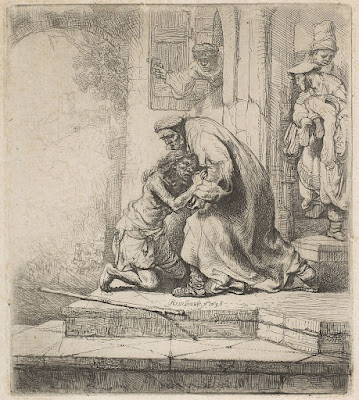
Repentance
arises from realizing that I am truly loved, and have always been loved, by an
unconditional love that has remained faithful and never failed even when I have
misunderstood it or not even realized it existed. Therefore, he arose and came to his father. The
text says that he came, not that he returned. There is a wholly fresh
quality to this particular journey that, rather than a “return”—a going back in
time and place—transforms it into the beginning of something radically new. And
the father, who before had done nothing but wait and hope and love silently and
painfully, now gets very busy indeed! He runs, welcomes, embraces, kisses, celebrates,
gives orders for the party to end all parties, and provides for all material
needs—all to honor his son as if he were a prince on his coronation day.
What
had at first seemed like emptiness was really not empty at all! Inaction is now
a memory that crumbles in the face of the many actions the father performs in
his ecstatic joy. His former silence now breaks into a torrent of words to
voice the many things his heart must explode within what is really an
uncontainable hymn of rejoicing. This rejoicing is the flip side of the
suffering covered over by silence and patience in the long night of waiting. We
now hear the father exhale the long breath of love, patience, and compassion.
The father couldn’t be less interested in his son’s moral conduct or in the
loss of the inheritance. The father unconditionally accepts his son back,
without demanding stages of repentance or subjecting him to tests of worthiness
in order to rub in his guilt and then perhaps
readmit him to the family he had willfully forsaken, granting him some reduced
status as a perpetual reminder of his rebellion. Not at all! The prodigal son
is welcomed back, as we have said, as nothing less than a prince!
The
elder son reacts badly. And yet the father goes to meet him, too, on his own
ground, reassuring him that whatever is his father’s is also his and that he is
loved just as he is. He doesn’t have to deserve or prove anything. He doesn’t
have to think that it is only by working like a slave that he will be loved.
Above all, the father’s attitude suggests that the elder son shouldn’t hide his own fear of love behind an obsession
with duty. But he is the one who has to walk that path. The younger son has
followed a very tortuous path to come to the realization that love doesn’t have to be earned, and
the elder son is called to discover the same thing, along a path that must be
his own and not an imitation of someone else’s.
The path of each of us toward grasping God’s unconditional love is personal and cannot be cloned. It is foolish to want to imitate other paths. I did not come to call the righteous, but sinners says Jesus. And what better tells of God’s unilateral, unconditional love more eloquently than Jesus’ love directed at tax collectors and sinners, at those whom the pious consider to be unrighteous and unholy? What is most pleasing to the God of Jesus Christ is that, if a person’s repentance and conversion do occur in the end, they are the work of their freedom cooperating with grace, the result of their feeling that they are loved, and of their surrender to the power of this love.
